Informal logic - Study guides, Class notes & Summaries
Looking for the best study guides, study notes and summaries about Informal logic? On this page you'll find 635 study documents about Informal logic.
Page 3 out of 635 results
Sort by
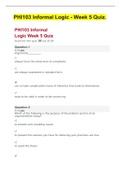
-
PHI103 Informal Logic - Week 5 Quiz.
- Exam (elaborations) • 10 pages • 2022
-
- $8.49
- 1x sold
- + learn more
PHI103 Informal Logic - Week 5 Quiz. PHI103 Informal Logic Week 5 Quiz Score for this quiz: 20 out of 20 Arguments . always have the same level of complexity are always expressed in standard form can include complicated chains of inference that build on themselves have to be valid in order to be convincing Which of the following is the purpose of the problem section of an argumentative essay? to present only troubling issues to present the reasons you ha...
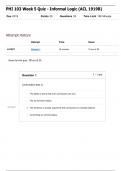
-
PHI 103 Week 5 Quiz - Informal Logic (ACL 1919B)
- Exam (elaborations) • 10 pages • 2023
-
Available in package deal
-
- $12.99
- + learn more
PHI 103 Week 5 Quiz - Informal Logic (ACL 1919B)Committing an informal fallacy The tendency to accept arguments with conclusions on already believes The ad hominem fallacy The ability to prove that one’s conclusions are true Confirmation bias is:

-
D265 - WGU - Critical Thinking - Reason and Evidence COMPLETE QUESTIONS AND ANSWERS 2023
- Exam (elaborations) • 11 pages • 2023
-
- $10.49
- 1x sold
- + learn more
D265 - WGU - Critical Thinking - Reason and Evidence COMPLETE QUESTIONS AND ANSWERS 2023 1. PROPOSITIONS: Are statements that can be true or false 2. NON-PROPOSITONS: Are sentences that are not statements about matters of fact or fiction. They do not make a claim that can be true or false. 3. SIMPLE PROPOSITIONS: Have no internal logic structure, meaning whether they are true or false does not depend on whether a part of them is true or false. They are simply true or false on their own....
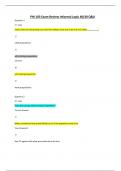
-
PHI 103 Exam Review Informal Logic 40/40 Q&A.
- Exam (elaborations) • 20 pages • 2023
-
Available in package deal
-
- $12.99
- + learn more
PHI 103 Exam Review Informal Logic 40/40 Q&A.Question 1 1 / 1 pts Claims that are interpreted such that they always come out to be true are called . valid propositions self-refuting propositions Correct! self-sealing proposition
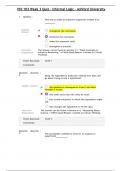
-
PHI 103 Week 3 Quiz – Informal Logic – Ashford University.
- Exam (elaborations) • 10 pages • 2023
-
Available in package deal
-
- $12.99
- + learn more
PHI 103 Week 3 Quiz – Informal Logic – Ashford University.Question : One way to make an inductive argument weaker is to . Student Answer: strengthen the conclusion eliminate the conclusion make the argument valid Instructor Explanation: strengthen a premise The answer can be found in Section 5.1, “Basic Concepts in Inductive Reasoning,” of With Good Reason: A Guide to Critical Thinking. Question 2. Question : Using the hypothetico-deductive method how does one go about t...
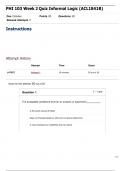
-
PHI 103 Week 2 Quiz Informal Logic.
- Exam (elaborations) • 10 pages • 2023
-
Available in package deal
-
- $12.99
- + learn more
PHI 103 Week 2 Quiz Informal Logic.The acceptable confidence level for an analysis or experiment . is the same across all fields does not change based on what one is trying to determine is more important for celebrities than for others
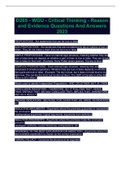
-
D265 - WGU - Critical Thinking - Reason and Evidence Questions And Answers 2023
- Exam (elaborations) • 9 pages • 2023
-
- $10.99
- 2x sold
- + learn more
PROPOSITIONS - Are statements that can be true or false NON-PROPOSITONS - Are sentences that are not statements about matters of fact or fiction. They do not make a claim that can be true or false. SIMPLE PROPOSITIONS - Have no internal logic structure, meaning whether they are true or false does not depend on whether a part of them is true or false. They are simply true or false on their own. (Example: Harry Potter wears glasses. The sky is blue.) COMPLEX PROPOSITIONS - Have internal l...
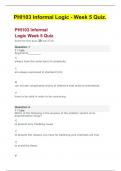
-
PHI103 Informal Logic - Week 5 Quiz.
- Exam (elaborations) • 10 pages • 2024
-
- $13.89
- + learn more
PHI103 Informal Logic - Week 5 Quiz. PHI103 Informal Logic Week 5 Quiz Score for this quiz: 20 out of 20 Arguments . always have the same level of complexity are always expressed in standard form can include complicated chains of inference that build on themselves have to be valid in order to be convincing Which of the following is the purpose of the problem section of an argumentative essay? to present only troubling issues to present the reasons you ha...
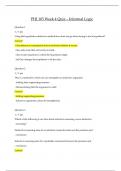
-
PHI 103 Week 4 Quiz – Informal Logic.
- Exam (elaborations) • 8 pages • 2023
-
Available in package deal
-
- $12.99
- + learn more
PHI 103 Week 4 Quiz – Informal Logic.Question 1 1 / 1 pts Using the hypothetico-deductive method how does one go about trying to test a hypothesis? Correct! One deduces a consequence from it and tests whether it occurs. One seeks tests that will verify its truth. One avoids situations in which the hypothesis might fail. One changes the hypothesis to fit the data. Question 2 1 / 1 pts This is a method by which one can strengthen an inductive argument. Adding false supporting premises...
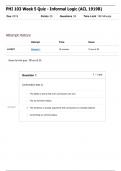
-
PHI 103 Week 5 Quiz - Informal Logic (ACL 1919B)
- Exam (elaborations) • 10 pages • 2023
-
Available in package deal
-
- $12.99
- + learn more
PHI 103 Week 5 Quiz - Informal Logic (ACL 1919B)Committing an informal fallacy The tendency to accept arguments with conclusions on already believes The ad hominem fallacy The ability to prove that one’s conclusions are true Confirmation bias is:

Did you know that on average a seller on Stuvia earns $82 per month selling study resources? Hmm, hint, hint. Discover all about earning on Stuvia


